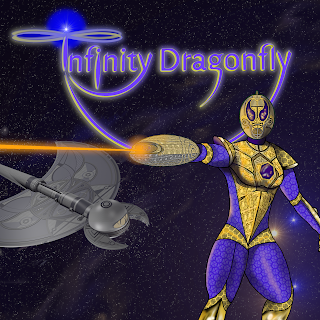Review: Legend of the Mind
As our story begins, David has taken a time travel drug called Can-D...
Woken by his radio playing the song The Martian Time Slip, David drops the hypodermic on the floor. Staggering to the bathroom he is 'zapped' into a space car, flying through the air towards a concert hall.
Pushing through the crowd towards the stage he meets the mysterious Palmer Eldritch (sporting robotic hand, eye and teeth) who informs David that he, David, is just in time to go on stage and begin his performance. David is perplexed by this so Eldritch gives him the drug Chew-Z to help him "remember the future". It works; David remembers The Martian Time Slip:
"Tomorrow I wrote this song."
Legend of the Mind by writer/artist Jeffrey Hopp is an homage to the hugely influential American science fiction author Philip K. Dick (1928-1982). The critically acclaimed movie Blade Runner is an adaptation of Dick's novel Do Androids Dream of Electric Sheep?, which is typical of his work, featuring themes of questioning identity, shifting reality, secret government/corporate conspiracy and the mental/spiritual emancipation of the human species. Many of his other novels and short stories have been adapted for film and television over the years.
Many of Dick's other works include altered states of consciousness (often via drug use) as a plot device to explore philosophical questions around the nature of reality. He was himself a long-time user of amphetamines and developed some interesting theories regarding the universe, religion and the powers of the human mind. Some of these ideas border on the schizophrenic (telepathy being a common paranoid fantasy among sufferers), and the author's troubled personal life certainly hints at an insecure mental state.
In Legends of the Mind our hero flits from one state of reality to the next, waking from a dream, activating or deactivating an immersive hologram, or being teleported to a new realm. There is no way of telling which, if any, of the arenas he finds himself in are 'real' reality or some alternative illusion.
Arrested for being a 'commie', he finds himself interrogated by a telepathic slime mold from Ganymede... a creature who soon becomes frustrated at David's dogged insistence on his conspiracy theories. Rescued from a mental institution by a mysterious author, he finds himself communing with a higher dimension of intelligence. A new journey begins...
Hopp has created a colourful, psychedelic adventure in which the reader is carried along a convoluted stream of events like a leaf riding rapids. The loosely-drawn, lively narrative panels are interspersed with dazzling full-page compositions of surreal magnificence. Space opera meets mysticism in a series of images that carries you beyond the familiar world and into pastures bizarre.
If you're looking for a comfortable, reassuring still point of reference, you are out of luck. All sense of stability is left behind in the heady rush through a seemingly neverending series of alternative universes.
Legend of the Mind - a Philip K. Dick tribute: The 4th Stigmata on Amazon
Legend of the Mind - a Philip K. Dick tribute: The 4th Stigmata on Facebook
Legend of the Mind by writer/artist Jeffrey Hopp is an homage to the hugely influential American science fiction author Philip K. Dick (1928-1982). The critically acclaimed movie Blade Runner is an adaptation of Dick's novel Do Androids Dream of Electric Sheep?, which is typical of his work, featuring themes of questioning identity, shifting reality, secret government/corporate conspiracy and the mental/spiritual emancipation of the human species. Many of his other novels and short stories have been adapted for film and television over the years.
Many of Dick's other works include altered states of consciousness (often via drug use) as a plot device to explore philosophical questions around the nature of reality. He was himself a long-time user of amphetamines and developed some interesting theories regarding the universe, religion and the powers of the human mind. Some of these ideas border on the schizophrenic (telepathy being a common paranoid fantasy among sufferers), and the author's troubled personal life certainly hints at an insecure mental state.
In Legends of the Mind our hero flits from one state of reality to the next, waking from a dream, activating or deactivating an immersive hologram, or being teleported to a new realm. There is no way of telling which, if any, of the arenas he finds himself in are 'real' reality or some alternative illusion.
Arrested for being a 'commie', he finds himself interrogated by a telepathic slime mold from Ganymede... a creature who soon becomes frustrated at David's dogged insistence on his conspiracy theories. Rescued from a mental institution by a mysterious author, he finds himself communing with a higher dimension of intelligence. A new journey begins...
Hopp has created a colourful, psychedelic adventure in which the reader is carried along a convoluted stream of events like a leaf riding rapids. The loosely-drawn, lively narrative panels are interspersed with dazzling full-page compositions of surreal magnificence. Space opera meets mysticism in a series of images that carries you beyond the familiar world and into pastures bizarre.
If you're looking for a comfortable, reassuring still point of reference, you are out of luck. All sense of stability is left behind in the heady rush through a seemingly neverending series of alternative universes.
"We are the builders of the maze of reality!"
Legend of the Mind - a Philip K. Dick tribute: The 4th Stigmata on Amazon
Legend of the Mind - a Philip K. Dick tribute: The 4th Stigmata on Facebook
https://www.manandrobotsociety.com
Zak Webber
Zak Webber
Twitter - @sfcomicartist / Instagram - @sfcomicartist
JOIN US ON FACEBOOK! - SCI-FI COMIC NEXUS
*****
***
*




Comments
Post a Comment